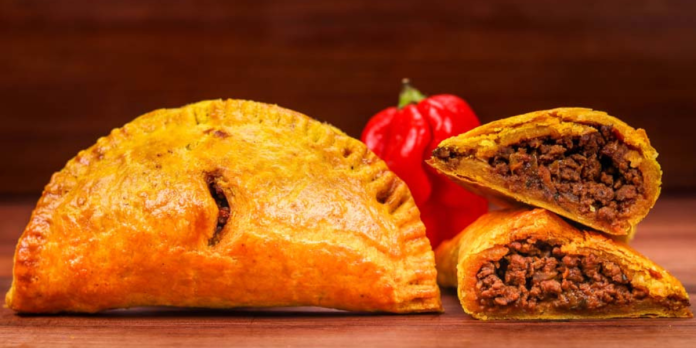Table of Contents
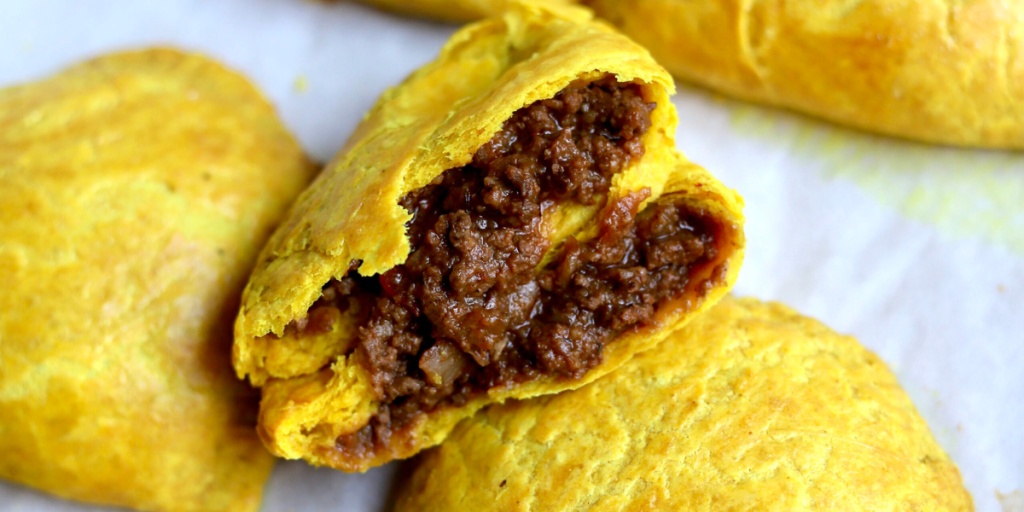
The Nigerian Meat Pie and the Jamaican Patty are iconic foods that have become cultural staples in Nigeria and Jamaica, respectively. Their origins, however, are deeply tied to the history and culinary evolution of each country.
A British Influence with African Roots
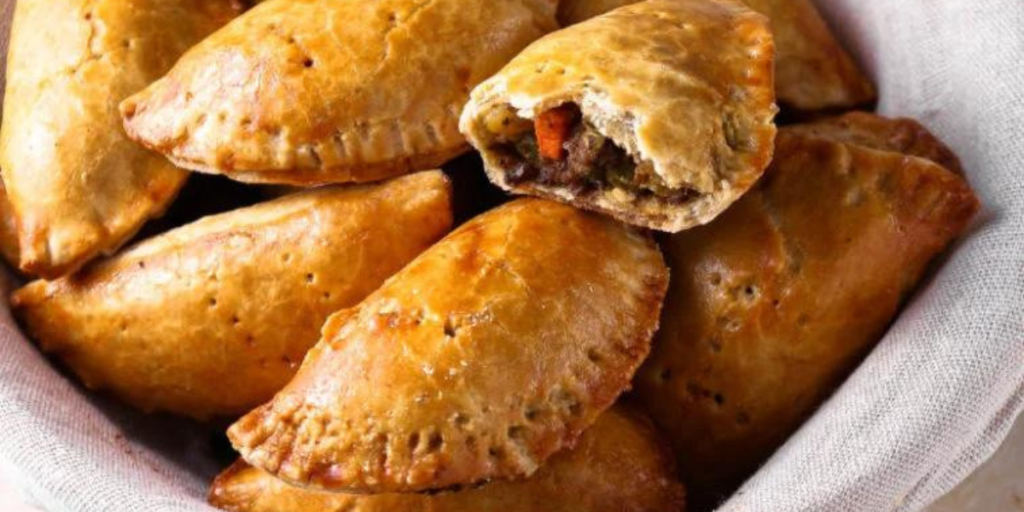
The Nigerian Meat Pie has its roots in the British colonization of Nigeria, drawing inspiration from the Cornish pasty. The Cornish pasty, a British pastry filled with meat and vegetables, was a popular food in the 19th century, especially among miners who needed a portable, hearty meal. As the British colonized parts of Africa, including Nigeria, they brought their food traditions with them. Over time, Nigerians adapted the recipe to include local ingredients and flavors, resulting in the Nigerian Meat Pie we know today.
While the basic structure of the meat pie remained similar to the Cornish pasty, the Nigerian version took on a unique flavor profile. Traditional Nigerian seasonings like thyme, curry powder, and stock cubes became key ingredients, giving the pie a taste that reflects the Nigerian palate. The addition of vegetables such as carrots and potatoes also mirrored the common use of starchy ingredients in Nigerian cooking, which often features dishes like jollof rice, yam porridge, and pounded yam.
A Fusion of Culinary Traditions

The Jamaican Patty also has colonial roots, but its development is a testament to Jamaica’s rich, multicultural history. Like the Nigerian Meat Pie, the Jamaican Patty was inspired by the Cornish pasty. However, Jamaica’s patty took on a much spicier and more flavorful identity due to the island’s mix of African, Indian, and Caribbean influences.
When the British brought indentured laborers from India to Jamaica in the 19th century, these laborers introduced a variety of spices, such as curry powder, turmeric, and allspice, which soon found their way into Jamaican cuisine. Meanwhile, the descendants of African slaves in Jamaica added their own traditional cooking methods and ingredients, including the use of fiery scotch bonnet peppers. The result was a dish that combines British pastry techniques with bold, spicy Caribbean flavors, making the Jamaican Patty a truly unique fusion food.
Meat Pie | What is the Best Thickener for Meat Pie?…
The Role of Nigerian Meat Pie and Jamaican Patty in Cultural Identity
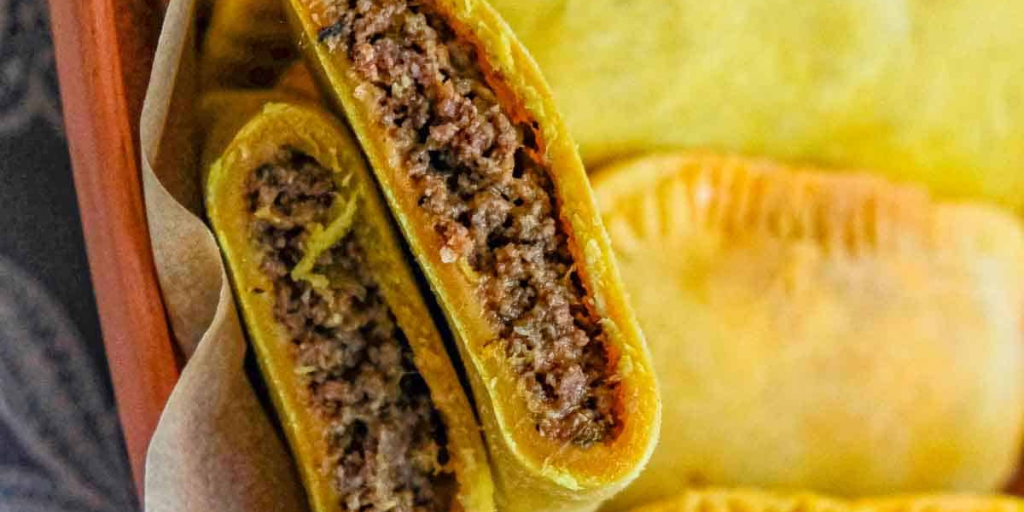
Food plays an essential role in cultural identity, and both the Nigerian Meat Pie and Jamaican Patty have become symbols of their respective nations’ culinary heritages.
Nigerian Meat Pie: A Symbol of Hospitality and Celebration
In Nigeria, the Nigerian Meat Pie is more than just a snack—it is a symbol of hospitality and celebration. Nigerians often serve meat pies at parties, weddings, and family gatherings, making it a beloved dish for special occasions. The meat pie is also a common feature in bakeries, supermarkets, and street food stalls, where it is enjoyed by people from all walks of life.
The portability of the Meat Pie has made it an ideal snack for busy workers, students, and travelers. It’s common to see meat pies being sold at motor parks (bus stations) across Nigeria, where travelers can quickly grab a pie to eat on the go. In schools, meat pies are a favorite snack for students during break times, and in offices, they are often eaten as a light lunch or snack.
Jamaican Patty: A National Treasure and Global Ambassador
In Jamaica, the Jamaican Patty holds a special place in the hearts of the people. It is considered a national treasure, representing the country’s vibrant food culture and its ability to blend diverse culinary influences. The patty is a staple of Jamaican cuisine, often eaten as a quick snack or meal, either on its own or paired with coco bread for a more filling option.
What sets the Jamaican Patty apart from other pastries is its versatility and accessibility. Whether you’re eating a patty from a street vendor in Kingston or buying one from a bakery in London, the patty remains a symbol of Jamaican pride. Jamaican immigrants have brought their beloved patty with them to cities around the world, where it has gained popularity among people of all backgrounds.
The global popularity of the Jamaican Patty has led to the creation of many variations, including vegetarian, chicken, and seafood patties. In cities with large Jamaican populations, such as New York, Toronto, and London, it’s not uncommon to find restaurants and bakeries that specialize in patties, serving them alongside other Jamaican delicacies like jerk chicken and rice and peas.
Best Nigerian Party Jollof Rice Recipe | 2024
Regional Variations
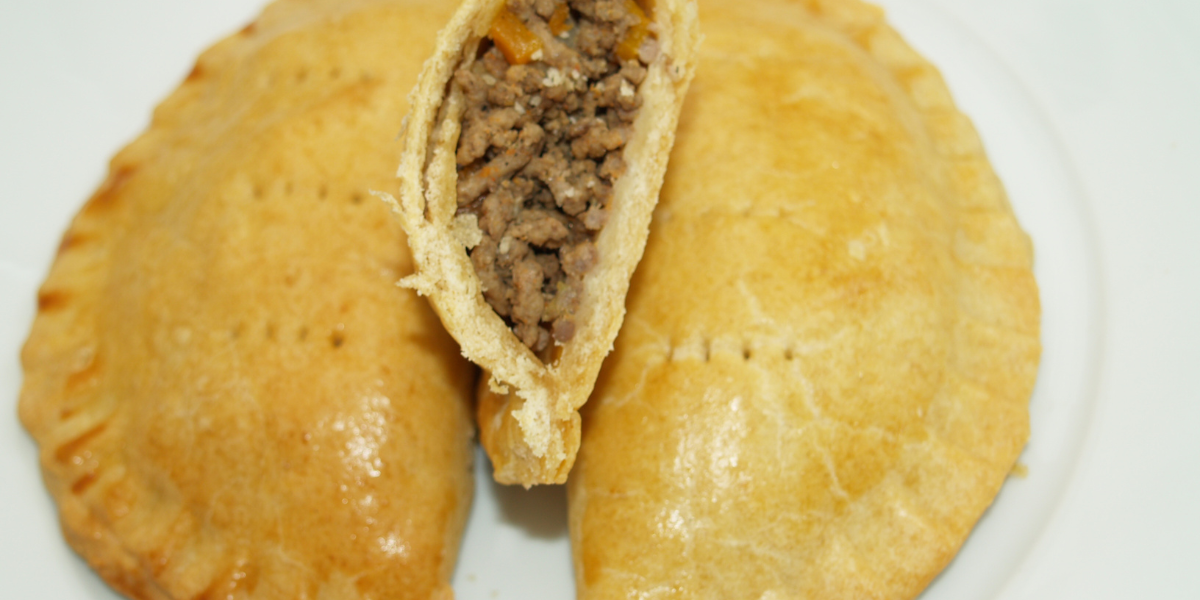
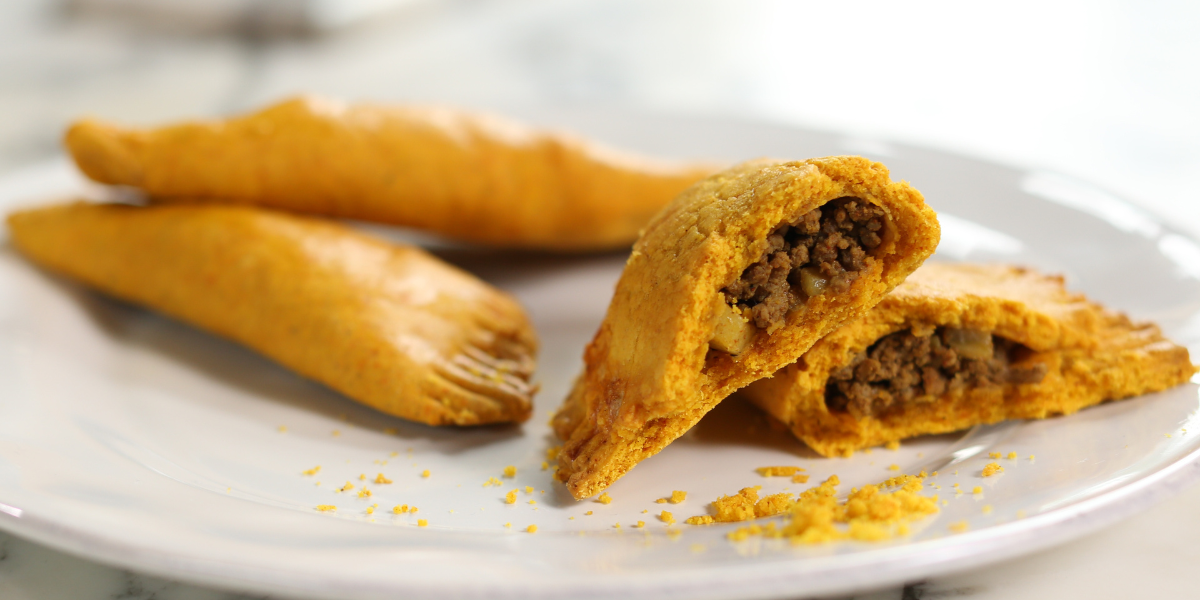
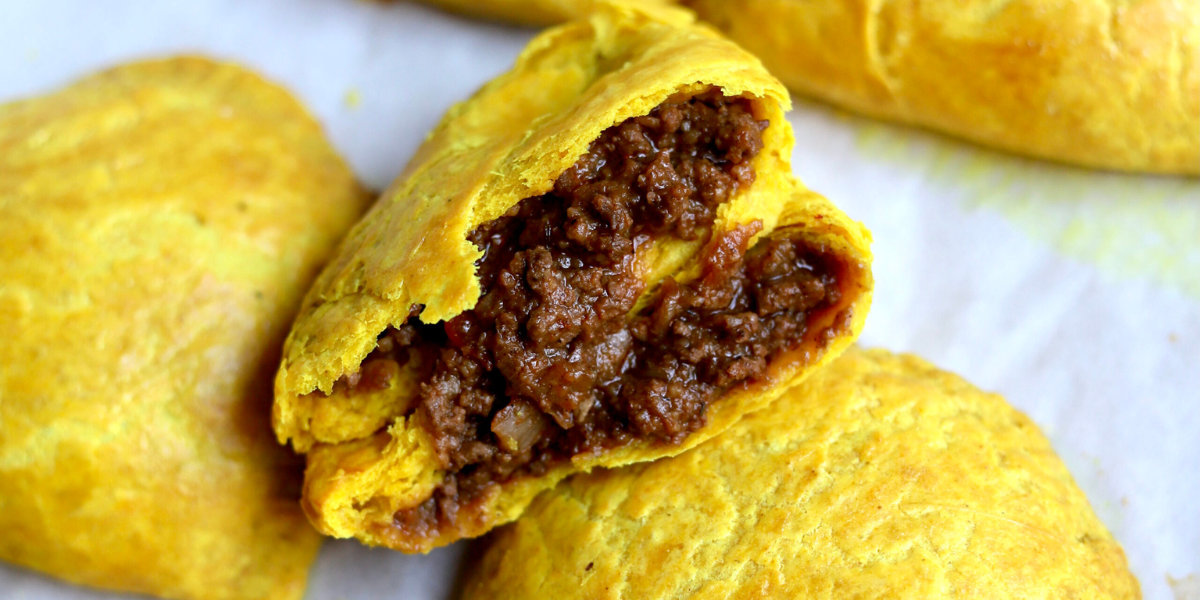

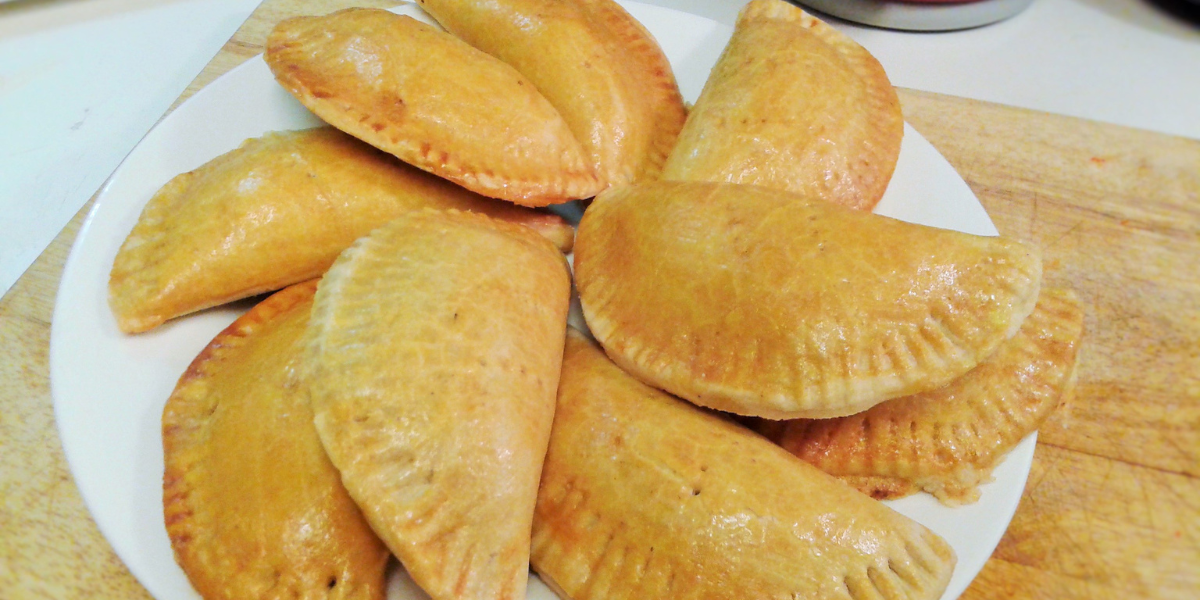
Though the basic recipes for Nigerian Meat Pie and Jamaican Patty are well-known, there are regional variations that add to the richness and diversity of these dishes.
Variations of Nigerian Meat Pie
In Nigeria, the Nigerian Meat Pie is generally made with a beef filling, but there are many regional variations that reflect the country’s diverse culinary landscape. For instance, in some parts of Nigeria, the filling may include chicken instead of beef, while in other regions, fish pies are a popular alternative. In the coastal areas of Nigeria, seafood is more readily available, so fish pies with fillings of smoked fish, shrimp, or even crayfish are common.
Vegetarian versions of the Meat Pie have also become popular in recent years, especially among health-conscious Nigerians. These vegetarian pies are typically filled with a mixture of vegetables like carrots, peas, green beans, and sometimes mushrooms. The rich, buttery crust remains the same, but the filling is made lighter and fresher by using a variety of colorful, nutrient-rich vegetables.
Variations of Jamaican Patty
Similarly, the Jamaican Patty has several variations, depending on the region and the ingredients available. The most common type of Jamaican Patty is the beef patty, but there are also chicken, vegetable, and seafood patties. In Jamaica, the chicken patty is a popular alternative for those who prefer a milder flavor, while the vegetable patty appeals to vegetarians and health-conscious eaters.
Seafood patties, particularly those made with shrimp or saltfish, are more common in coastal areas of Jamaica, where seafood is abundant. These patties offer a unique twist on the traditional beef patty, with the rich flavors of the ocean complementing the spicy seasoning. In addition, some Jamaican patties are made with a pastry dough that includes coconut oil instead of butter, adding a subtle coconut flavor to the crust.
In the diaspora, Jamaican Patties have also been adapted to suit local tastes. For instance, in the United States and Canada, where vegetarian and vegan diets are more common, there are now patties filled with plant-based ingredients like lentils, chickpeas, and tofu. These patties still maintain the spicy, flavorful essence of the traditional Jamaican Patty but are made to accommodate the growing demand for plant-based foods.
Taste and Texture: A Detailed Comparison
One of the key differences between the Nigerian Meat Pie and Jamaican Patty lies in their taste and texture. Though both are savory pastries, their fillings, dough, and preparation methods create distinct sensory experiences.
Nigerian Meat Pie: Soft and Buttery
The Nigerian Meat Pie is known for its soft, buttery crust and savory, mildly spiced filling. The dough is typically made with flour, butter, and sometimes a little milk, resulting in a tender, flaky pastry that melts in your mouth. The filling is usually made with ground beef, potatoes, carrots, and spices, creating a hearty and satisfying combination.
When you bite into a Nigerian Meat Pie, the first thing you’ll notice is the rich, buttery taste of the crust. It’s soft, but not too crumbly, making it easy to eat without falling apart. The filling inside is moist but not too wet, with the flavors of the beef and vegetables perfectly balanced by the mild seasoning. The overall taste is savory and comforting, making the meat pie a popular snack or light meal in Nigeria.
Jamaican Patty: Spicy and Flaky
In contrast, the Jamaican Patty is known for its bold, spicy flavor and flaky, crispy crust. The dough is often made with flour, butter, and turmeric or curry powder, which gives the patty its signature yellow color. The filling is typically made with ground beef or chicken, seasoned with a blend of spices like allspice, thyme, and scotch bonnet peppers.
The first thing you’ll notice when biting into a Jamaican Patty is the crunch of the flaky pastry crust. It’s much crispier than the Nigerian Meat Pie, offering a satisfying texture that contrasts with the rich, spicy filling inside. The heat from the scotch bonnet peppers hits you immediately, followed by the earthy flavors of allspice and thyme. The filling is spicier and more intense than the mild filling of the Nigerian Meat Pie, making the patty a favorite among those who love bold, fiery flavors.
How to cook party jollof rice with bay leaf using| Best…
Modern Variations and Creative Twists on the Nigerian Meat Pie and Jamaican Patty
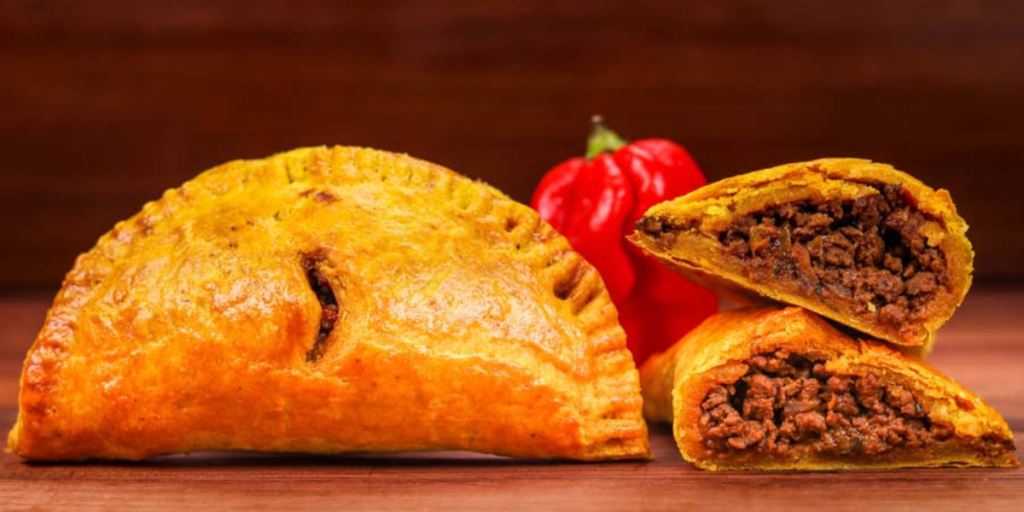
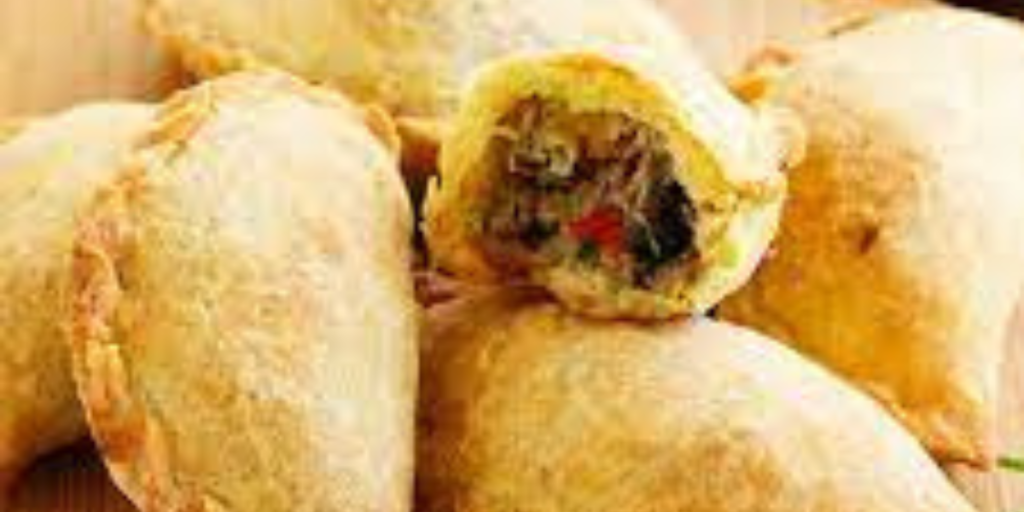
As time has progressed, both the Nigerian Meat Pie and Jamaican Patty have undergone creative reinterpretations, influenced by changing dietary preferences, the rise of health-conscious eating, and the globalization of cuisine. Modern versions now cater to diverse dietary needs while maintaining the core essence of these beloved pastries.
In Nigeria, modern trends in food, particularly the rising focus on health and wellness, have led to a variety of healthier versions of the Nigerian Meat Pie. While the traditional meat pie uses butter and flour for the crust and a beef filling, the modern versions often incorporate whole wheat flour, which is higher in fiber and nutrients. Some versions substitute butter with plant-based oils or margarine, reducing the saturated fat content.
Vegan versions of the Nigerian Meat Pie have also emerged, catering to those who avoid animal products. In place of ground beef, fillings now include plant-based alternatives like lentils, tofu, mushrooms, or a combination of root vegetables such as yams and sweet potatoes. The use of rich spices and herbs like thyme, rosemary, and curry powder ensures that these pies remain just as flavorful as their meat-filled counterparts, even without animal protein. Some bakers go a step further by infusing the dough with herbs and seeds like sesame or chia for added texture and nutritional value.
Gluten-Free and Alternative Jamaican Patties
Similarly, the Jamaican Patty has adapted to the changing dietary preferences of modern consumers. In the Caribbean, particularly among health-conscious food enthusiasts, there has been a rise in gluten-free Jamaican patties, where wheat flour is replaced with gluten-free alternatives like cassava flour, rice flour, or almond flour. These versions still manage to capture the signature flakiness of the traditional patty dough.
Another emerging trend is the creation of Jamaican Patties filled with plant-based proteins such as black beans, jackfruit, and tempeh. These vegan and vegetarian variations offer all the spiciness of the classic patty without the meat, allowing vegetarians and vegans to enjoy the iconic flavors of Jamaica. For those avoiding spicy foods, some chefs create milder patties filled with vegetables, ackee (the national fruit of Jamaica), or even cheese.
Fusion Flavors and Global Twists
In both Nigeria and Jamaica, as well as in international diaspora communities, chefs and home cooks have taken creative liberties with both pastries, incorporating new flavors and ingredients from around the world. For instance, fusion recipes combining Nigerian and Jamaican culinary traditions have given rise to pies like the “Jamaican-inspired Nigerian Meat Pie,” which infuses the Nigerian pie filling with Jamaican spices like jerk seasoning and scotch bonnet peppers.
Similarly, Jamaican chefs have experimented with new twists on the classic patty by adding non-traditional fillings such as curried lamb, goat, or even jerked tofu. These innovative takes combine elements of Caribbean and other global cuisines, showcasing how food continues to evolve as it crosses borders.
Best Meat Pie Nigerian Recipe in 2024
Nutritional Comparison: Nigerian
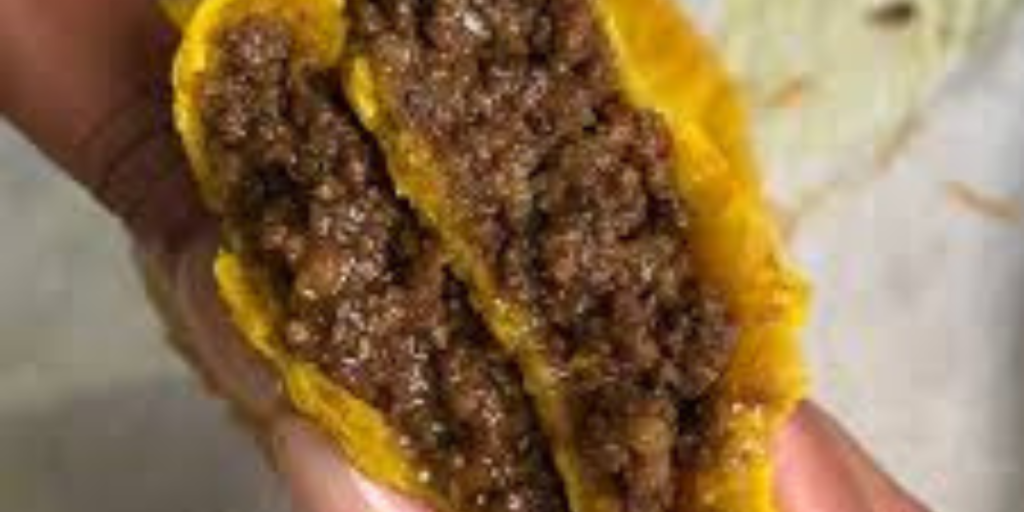
The nutritional profiles of the Nigerian Meat Pie and Jamaican Patty vary based on ingredients, preparation methods, and serving sizes. While both pastries are relatively high in calories due to their pastry crusts, they offer different nutritional benefits based on their fillings and the types of fats used in their preparation.
Hearty and Filling
A traditional Nigerian Meat Pie provides a balanced combination of protein, carbohydrates, and fats. The pastry dough, made from flour and butter, contributes to its carbohydrate and fat content, while the beef filling supplies protein. The addition of vegetables like carrots and potatoes enhances the pie’s nutritional value by providing essential vitamins, fiber, and antioxidants.
On average, a single Nigerian Meat Pie contains around 300-400 calories, depending on its size and the amount of filling. While the pastry is rich in saturated fats from the butter, modern versions using vegetable oils or margarine help reduce the saturated fat content. Additionally, the inclusion of vegetables like carrots and peas boosts the fiber content, making the pie more filling and satisfying.
For health-conscious eaters, opting for whole wheat or gluten-free crusts can lower the pie’s glycemic index, reducing the potential spike in blood sugar that comes from refined carbohydrates.
Jamaican Patty: Spicy and Flavor-Packed
The Jamaican Patty is slightly more calorie-dense due to its flakier crust, which often contains more fat than the softer crust of the Nigerian Meat Pie. The pastry dough is traditionally made with butter or lard, giving it a rich, crispy texture. However, this also increases the fat content, especially if saturated fats are used.
A typical Jamaican Patty provides roughly 400-500 calories, with a significant portion of these calories coming from the fat in the dough. The filling, typically made from spiced beef or chicken, contributes protein, while the use of spices like turmeric and scotch bonnet peppers offers anti-inflammatory benefits. Vegetarian patties filled with legumes or vegetables tend to be lower in calories and fat while providing more fiber.
Recent health-conscious variations of the Jamaican Patty have replaced traditional fats with healthier options like coconut oil, which is high in medium-chain triglycerides (MCTs), known for boosting metabolism and energy levels. For those looking to reduce calorie intake, patties filled with lean meats or plant-based proteins are a lighter alternative without sacrificing flavor.
Global Impact and Popularity

The global appeal of both the Nigerian Meat Pie and the Jamaican Patty cannot be overstated. While these pastries were once regional favorites, they have gained international recognition, with fans around the world eager to try these flavorful snacks.
A Diaspora Favorite
As Nigerians have migrated to various parts of the world, they’ve brought their beloved Nigerian Meat Pie with them, making it a popular food in Nigerian communities abroad. In countries like the United Kingdom, the United States, and Canada, bakeries and restaurants catering to Nigerian immigrants often feature meat pies on their menus. These pies are a source of nostalgia for many Nigerians living abroad, offering a taste of home in a foreign land.
In cities with large Nigerian populations, like London, New York, and Houston, it’s common to find shops that sell Nigerian Meat Pies, alongside other Nigerian street foods like puff-puff and chin-chin. These pies are also frequently served at Nigerian events and celebrations, where they continue to play a role in the country’s tradition of hospitality and togetherness.
A Global Sensation
The Jamaican Patty, however, has arguably had an even larger global impact. Jamaican immigrants have introduced the patty to countries across the globe, where it has gained a loyal following. In cities with significant Caribbean populations, such as New York, Toronto, and London, Jamaican Patties are sold in bakeries, supermarkets, and even fast-food chains.
In fact, the Jamaican Patty has become so popular in some parts of the world that it has been adapted to suit local tastes. In Canada, for example, the patty is often served with coco bread, creating a more substantial meal. In the United Kingdom, it’s common to find variations of the patty in mainstream supermarkets, where they are marketed alongside other global snacks.
The global success of the Jamaican Patty is a testament to its universal appeal. With its crispy crust and flavorful filling, the patty offers a satisfying combination of textures and tastes that transcend cultural boundaries.
Social Significance and Role in the Community
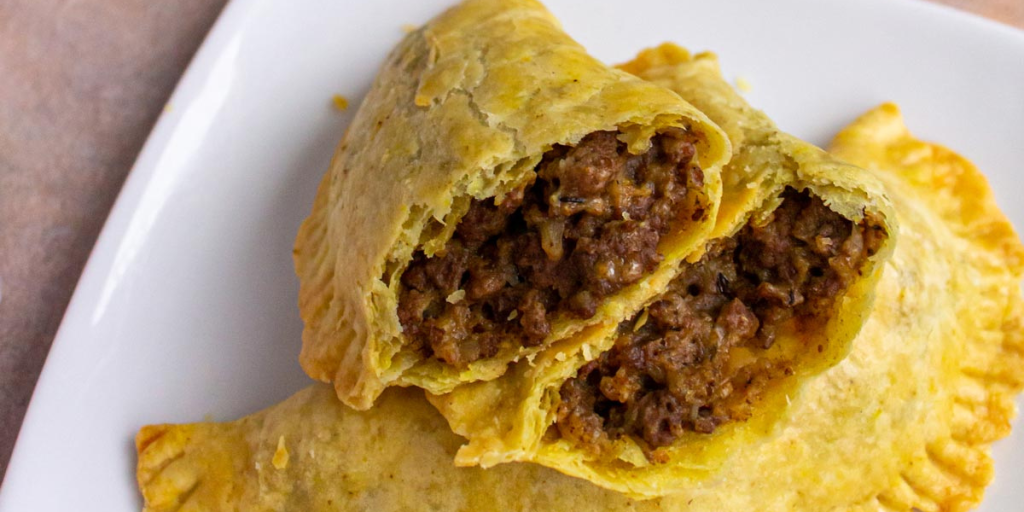
Beyond being delicious snacks, the Nigerian Meat Pie and Jamaican Patty hold deeper social and cultural significance in their respective communities. These pastries are often associated with hospitality, celebrations, and togetherness.
Nigerian Meat Pie: A Celebration of Unity
In Nigeria, the Nigerian Meat Pie is often served at gatherings and parties, where it is shared among family and friends. It’s a dish that brings people together, whether they’re celebrating a birthday, a wedding, or just enjoying a casual get-together. The act of sharing a plate of meat pies symbolizes unity and togetherness, reflecting the communal nature of Nigerian society.
The portability and convenience of the Nigerian Meat Pie also make it a popular snack for people on the go. Whether sold by street vendors or prepared at home, the meat pie is a comfort food that provides nourishment and sustenance during the busy days of everyday life.
A Symbol of Resilience
In Jamaica, the Jamaican Patty is more than just a snack—it’s a symbol of the country’s resilience and creativity. The patty’s origins as a fusion of British, African, and Indian influences reflect Jamaica’s history as a melting pot of cultures, while its enduring popularity speaks to the resourcefulness of the Jamaican people.
Throughout the years, the Jamaican Patty has remained a beloved food for both locals and the diaspora. It’s often sold in bustling markets and busy street corners, where it provides a quick, affordable, and satisfying meal for those on the move. The patty’s role in Jamaican society is a testament to the country’s ability to create something uniquely its own, using the influences of its diverse cultural history.
A Culinary Bridge Between Cultures
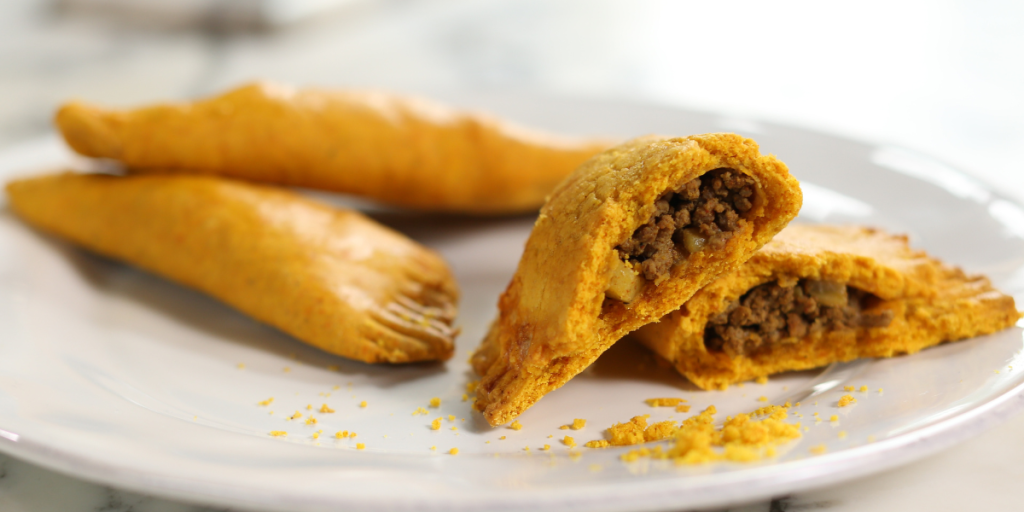
Both the Nigerian Meat Pie and Jamaican Patty represent the rich culinary traditions of their respective countries. While they share similarities in their structure—a pastry filled with savory ingredients—their differences highlight the unique flavors and cultural histories of Nigeria and Jamaica. From the soft, buttery crust of the Nigerian Meat Pie to the spicy, flaky dough of the Jamaican Patty, each pastry tells a story of its people’s history, creativity, and resilience.
In the end, whether you prefer the hearty, vegetable-packed filling of a Nigerian Meat Pie or the fiery, spice-laden interior of a Jamaican Patty, one thing is certain: both pastries are beloved around the world for good reason. They offer a taste of home for those in the diaspora, a culinary adventure for those trying them for the first time, and a bridge between cultures for those looking to explore the world through food.
The next time you bite into a Nigerian Meat Pie or a Jamaican Patty, take a moment to appreciate the history, craftsmanship, and flavor that have gone into creating these iconic snacks. They are not just food—they are a celebration of culture, community, and the universal love of good food.
















